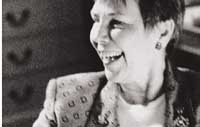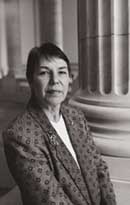My husband and I were good and caring parents, and we
wanted a large family of four children. By the time I was 25,
we had a 3 1/2 year old daughter and a 2 1/2 year old son, and
I was pregnant with our third child. In my first trimester, I
caught what seemed to be a simple cold. When I developed a
very high fever, I was diagnosed with the measles. For an
adult, the measles is like a bad case of the flu, but for a
fetus, it is a disaster.
My husband was an obstetrician and understood what a
profound effect the measles would have on the fetus.
Subsequent tests confirmed our worst fears. If I carried my
pregnancy to term, our baby would likely be blind, deaf, and
severely brain damaged. Everybody we spoke to in the medical
community was convinced that the fetus would be severely
affected. We were so frightened and so sad as we considered
our options.
We were anxious to have more children, but we did not want
our child to suffer and to feel such terrible pain. We weighed
our responsibility to our unborn child and made the
heart-wrenching decision that bearing this child wasn't the
responsible thing to do. We decided to seek an abortion.
My obstetrician was sympathetic, but said that he could not
help because abortion was illegal and that he and I could be
prosecuted and jailed for terminating my pregnancy. At the
time, the only way to obtain an abortion legally was if the
life of the mother was threatened.
I was absolutely not going to have an illegal abortion,
which could be terribly dangerous. I knew women who went to
San Francisco or Mexico, not knowing whether they would come
back healthy — or come back at all. In desperation, they were
forced to make those horrible, life-threatening choices
because abortion, which could have been done simply and safely
by licensed physicians, was illegal. My husband had seen so
many women with botched abortions who had been dumped on the
front lawn of the hospital where he worked. It was a
frightening time for women.
My doctor said there was another possibility. Because I
have only one kidney, we might be able to persuade a panel of
physicians at the hospital to recommend terminating the
pregnancy because it placed my life in danger.
We hung our hopes on this chance. My doctor presented my
case to the physicians. They were willing to approve the
abortion, but only if I had a total hysterectomy so that my
life would never again be "threatened" by a pregnancy.
I faced a dreadful choice. I could carry a severely damaged
fetus to term or lose my fertility forever. I adored and
enjoyed my children and loved the idea of having more. But as
someone who loves children, I could not bring a child into the
world who was going to be severely damaged. It would not be
responsible to do so nor would it be fair to my two little
children who also had real needs.
We made a choice — a difficult, painful choice — but one
that was right for me and for my family. We chose the abortion
— and the hysterectomy that went with it.
All of these deliberations took so long that I was four
months pregnant when they finally did the hysterectomy. The
surgery, under general anaesthesia, was a lot more dangerous
than an abortion would have been.
We were both very, very sad about our experience — very,
very sad. I had my kids to think of, so I got on with life,
but it was depressing. One of the most depressing aspects was
that somebody else had made a decision for me that I was quite
capable of making.
Today, I have a loving husband, two wonderful children and
a grandchild who brings me enormous joy. My life is very
fulfilling and I look forward, not back. I remain angry,
however, that a responsible, loving family was put in that
position. 
I am a very private person, and I didn't tell anyone
outside my family about my experience. I've always been a
fighter for choice, but there comes a time when you really
have to put yourself on the line. I decided to speak out about
my experience to warn people about the dangers if this right
is taken away.
For the last several years, anti-choice Members of Congress
have been attacking a woman's right to choose. Step by step,
they are very effectively chipping away at our basic right. If
you are a federal employee, you cannot choose a health
insurance plan that covers abortion. The District of Columbia
cannot use its own funds to pay for abortions for its
low-income residents. And if you are stationed overseas in the
military, you cannot have an abortion in a military hospital
even if you paid for it with your own money.
With these insidious votes — take a little bit of a right
here, then a little bit of a right there — pretty soon you're
left with a pretty empty right. That is why we must be ever
vigilant to ensure that the right to choose is not left in the
hands of politicians who know nothing whatsoever about you or
your circumstances.
I am also telling my story because I am concerned that
young women don't know what it was like when abortion was
illegal. And they don't realize that they have to keep
fighting to safeguard the right to safe, legal abortion.
I am not afraid to speak out. I am a fighter. I fought
against apartheid when I lived in South Africa. I fought for
civil rights in the U.S. I'm determined to warn people that a
woman's right to choose is not something abstract — it is a
very real right — and without it, women will die again from
botched abortions.
A woman facing threats to her life or health or
carrying a fetus that has been diagnosed with severe anomalies
must have access to appropriate medical care, including
abortion. Families and their physicians, not politicians, must
be permitted to make these difficult decisions.
Opponents of choice, by focusing the political debate on
abortion late in pregnancy, are using sensational graphics and
rhetoric to further their goal of making all abortion illegal.
As part of their strategy, the 106th Congress passed a bill
outlawing so-called "partial-birth" abortion, "Partial-Birth"
Abortion Ban Act of 2000 HR 3660.
The bill passed by the 106th Congress prevents doctors from
exercising their best medical judgement, applies to abortions
before and after viability, and contains no exception for when
a banned procedure is necessary to preserve a woman's health.
To learn more about the laws in your state, read the NARAL
state
by state chart of bans on late term abortions.
Click
here to find out if your Congressperson voted for HR 3660.
Women's Stories


 U.S. Rep. Elizabeth Furse (D-OR) was raised in
South Africa, where she began her public service career by
marching against apartheid with her mother, a founder of the
South African women's anti-apartheid group Black Sash. Rep.
Furse moved to the U.S. as a young woman and eventually
settled in Oregon, where she became known for her advocacy on
behalf of low-income women, farm workers and Native Americans.
Rep. Furse was elected to Congress along with a record number
of women lawmakers during the 1992 "Year of the Woman." She is
serving her third term.
U.S. Rep. Elizabeth Furse (D-OR) was raised in
South Africa, where she began her public service career by
marching against apartheid with her mother, a founder of the
South African women's anti-apartheid group Black Sash. Rep.
Furse moved to the U.S. as a young woman and eventually
settled in Oregon, where she became known for her advocacy on
behalf of low-income women, farm workers and Native Americans.
Rep. Furse was elected to Congress along with a record number
of women lawmakers during the 1992 "Year of the Woman." She is
serving her third term.
